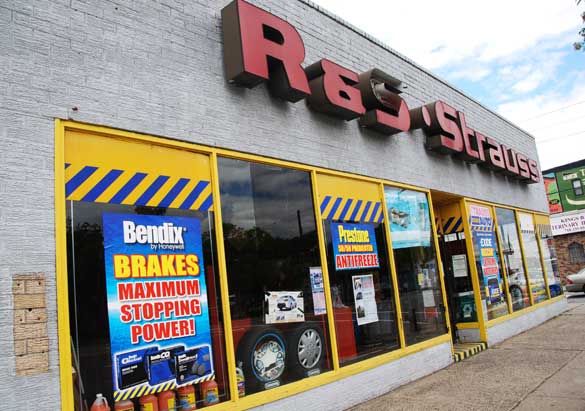R & S Strauss Files For Bankruptcy, And You Can Too!

Telling Tips is a series of articles from local experts to help you save money, make better decisions and plan for a better future.
I remember years ago, passing by R & S Strauss Discount Auto at 2570 Coney Island Avenue on my way to get bagels from Hot Bagels (what’s it called now?) and getting a movie at Blockbuster (also, gone). The neighborhood constantly changes as businesses open up and close down.
R & S was in the community for quite some time, but the economic climate changed so dramatically in the past few years that every brick and mortar outlet is having a tough time paying the rent.
What happens if it happens to you? What happens if you’re a small business owner and you just can’t afford to keep the lights on anymore? You, like many other businesses around you, can file for Bankruptcy. However, there are some things to keep in mind.
If your business is like mine, you likely started with either personal loans, commercial loans or credit cards. In either case, unless someone really goofed, you personally guaranteed your debts.
This is where most people misinterpret the protections they have in a business. Let’s say you owned a pizza store on Avenue Z and you incorporated the business. Chances are, if someone sued you they would not likely be able to make you personally responsible for the debt itself (unless they could “pierce the corporate veil,” but that’s another blog altogether).
That’s the beauty of incorporating a business. The same cannot be said of debt. If you started the business and you applied for an American Express card, it’s almost 100 percent certain that you personally guaranteed that debt. You told Amex that, should the business go under, you’d still be responsible for the debt. That is the huge difference between you and R & S Strauss.
R & S likely had creditors that may have had a security interest in their inventory or in their receivables. A mom and pop shop probably wouldn’t have this type of inventory, so the bank or lender will make sure that it’s the business owner’s neck on the line.
What does this mean for you? It means if your business is going under, you have to do some planning. You have to see whether or not you are personally responsible to your creditors. How do you check? Well, if you signed a lease, you’ll likely see a personal guarantee at the end of the lease. That, almost certainly, would make you personally responsible for the amount you still owe the landlord under the lease.
The same can be said of your credit cards. Call the companies and ask them to send you copies of your application. Ask them if you’re personally responsible. Then, speak to a lawyer to see what your options are.
In our economic climate, people aren’t going to banks to receive loans anymore. They’re financing their businesses with their own credit through credit cards. Because of this, in order to get rid of the debt, individuals will have to file individual bankruptcy, as opposed to what R & S Strauss did.
In other words, if you started a business and you realize that you’re $150,000 in debt and will have to close, it is you who will be filing for bankruptcy, not just your business.
Proper planning with an attorney can save you some headaches down the road.
Daniel Gershburg Esq., is a real estate and bankruptcy attorney with offices in Sheepshead Bay and Manhattan. The practice was specifically set up to change the way people view attorneys, by incorporating radical ideas like calling people back quickly, returning emails, giving clients ’round the clock access to their cases and charging low fees. For more information please visit Brooklyn Real Estate Attorney Daniel Gershburg‘s website.
Disclaimer : This post is for general informational purposes only. It doesn’t establish any attorney-client relationship and you should speak with a bankruptcy attorney with any questions you have before filing.



